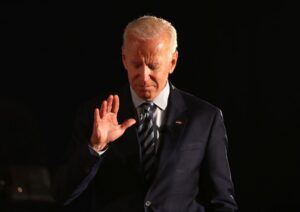
(Photo by Justin Sullivan/Getty Images)
To its credit, the Biden administration has declassified a four-page analysis that confirms Crown Prince of Saudi Arabia Mohammed bin Salman’s role in the killing of Washington Post journalist Jamal Khashoggi. In the aftermath of horrific crimes, it is essential to establish the truth. I share, however, the fury that the administration has received for its failure to impose sanctions on the crown prince, known as MBS, despite the report’s findings.
In the spring of 2018, MBS visited the United States to reshape the kingdom’s image. On his rock star tour across the country, MBS, who is also the kingdom’s Minister of Defense, met with leaders from both parties, former presidents, investors, celebrities, and executives from across major industries. For the most part, only a few challenged MBS, as he rewrote history without compunction on human rights concerns like the kingdom’s vicious bombing campaign in Yemen and its crackdown on dissent by activists and writers.

Pursuing The Pro Bono Story: A Conversation With Alicia Aiken
This Pro Bono Week, get inspired to give back with PLI’s Pursuing Justice: The Pro Bono Files, a one-of-a-kind podcast hosted by Alicia Aiken.
Sanctions are not a categorical rule to accountability. In fact, the human rights community’s longtime obsession with sanctions as a tool of first resort has often backfired. But sanctions make more sense when an individual like MBS has ties with powerful people. A temporary decline in attendance at the kingdom’s so-called Davos in the Desert investment forum will not stop the crown prince, who manages the kingdom’s day-to-day affairs, from securing further arms contracts.
Instead of boycotting Davos in the Desert, the administration should invoke the Global Magnitsky Human Rights Accountability Act, which the Department of Treasury has already used to sanction 17 Saudi officials in connection with their role in the Khashoggi murder. The sanctions, in addition to an entry ban, would freeze MBS’s financial assets under the United States jurisdiction and prohibit transactions with his entities.
Imposing sanctions should be the minimum response because economic penalties alone will not deter MBS from pursuing further crimes. The rule of law relies on well-defined mechanisms of accountability. We also have to recognize that accountability can provide diplomatic opportunities for tackling long-term issues.
Moving forward, the United States should commit itself to supporting civil society in Saudi Arabia. A strong posture on accountability would require the kingdom to demonstrate that there are in fact areas that the United States should work with it on. For example, both countries have an interest in addressing environmental concerns by helping the kingdom diversify its economy.

3 Ways Lawyers Are Finding New Efficiencies With AI
Those who’ve adopted legal-specific systems are seeing big benefits.
Many have pointed out that Khashoggi and his family have had ties with the Saudi monarchy that go back generations. Over the years, however, Khashoggi balanced his complicated role as a representative of the monarchy with expressing his desires for greater monarchical reform. Policymakers should take care to remember that it was Khashoggi’s independent mind that made him a target. Notwithstanding geopolitical concerns, it is imperative that we use our strength and influence to pursue justice in Khashoggi’s case.
 Mandeep S. Minhas is a lawyer practicing in New York.
Mandeep S. Minhas is a lawyer practicing in New York.